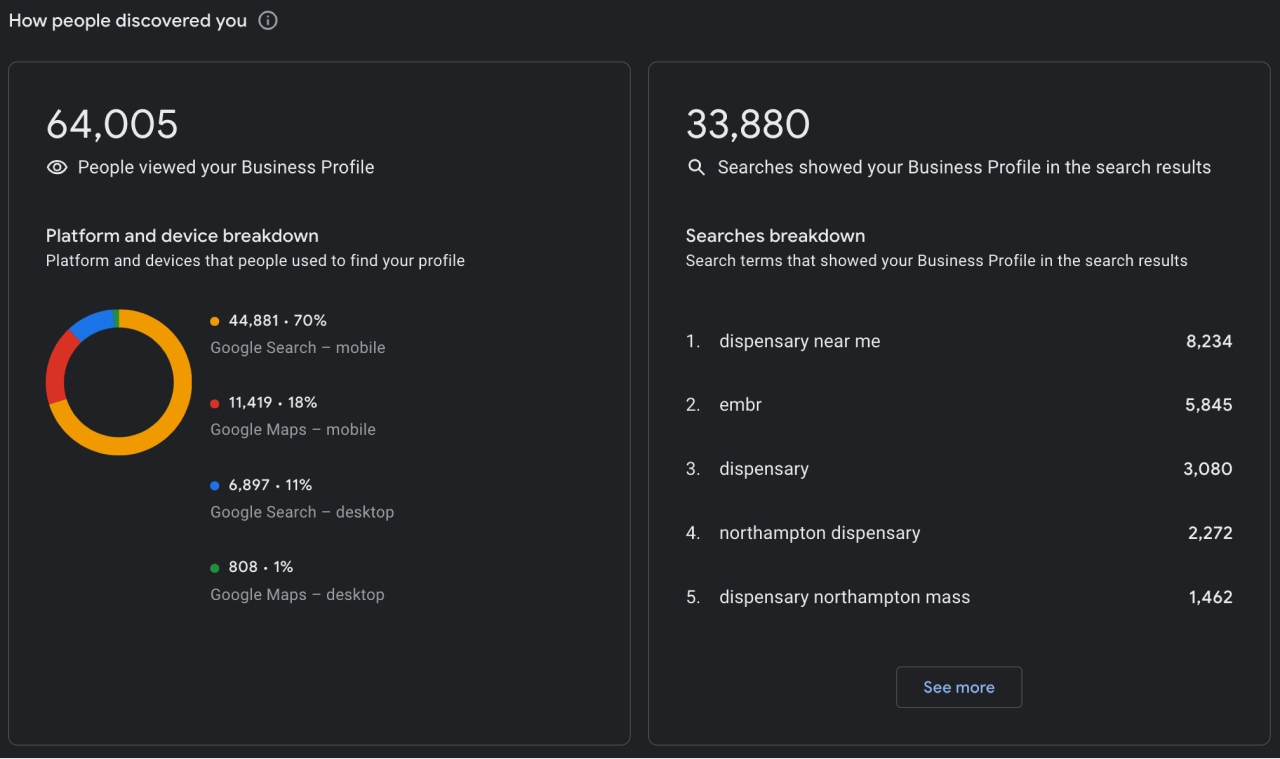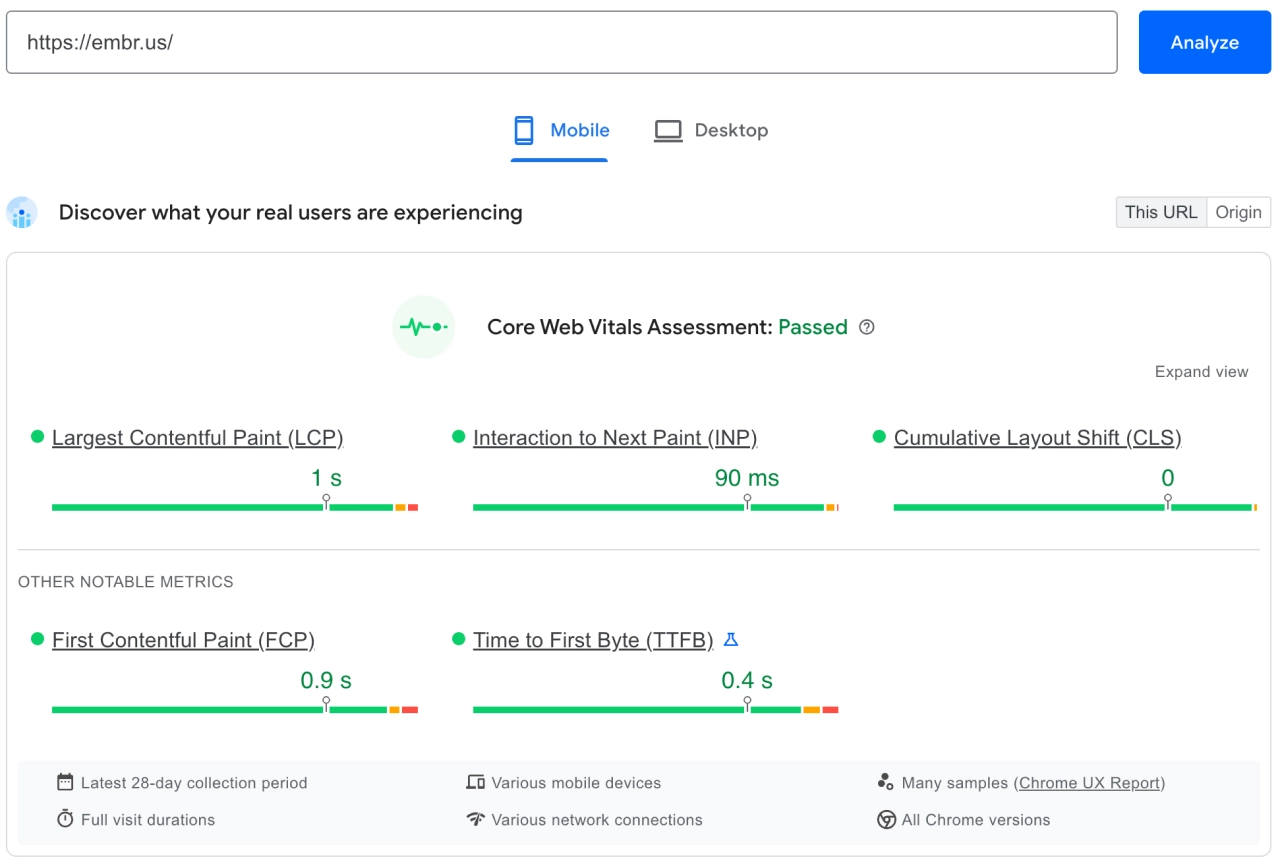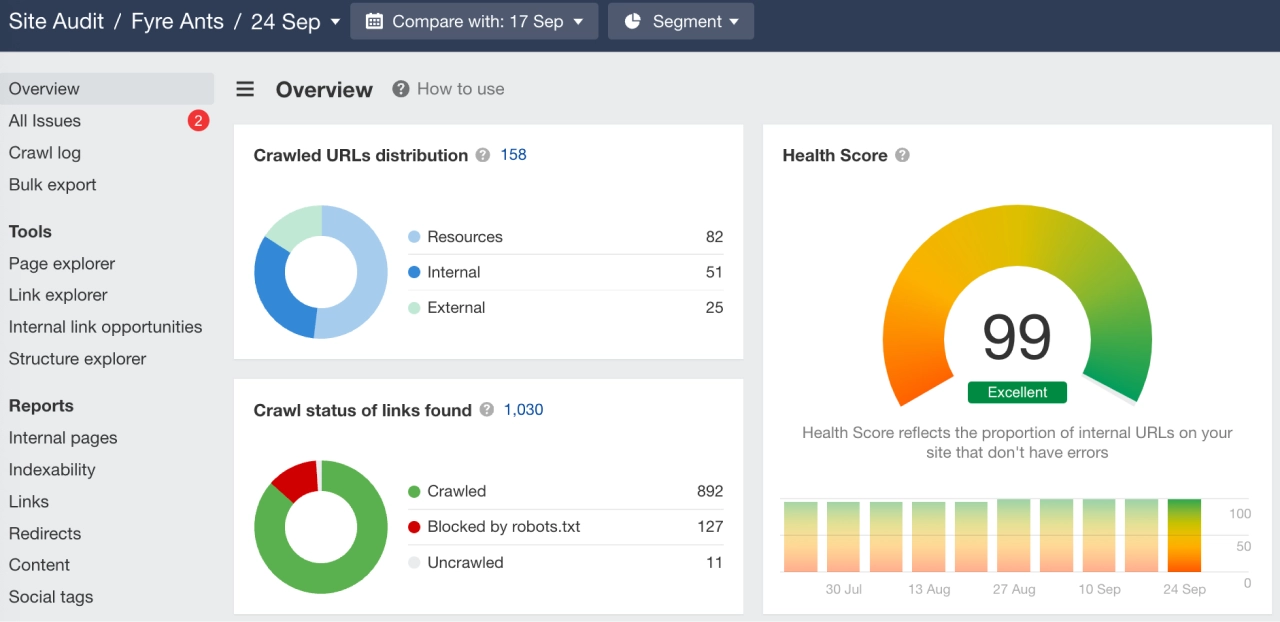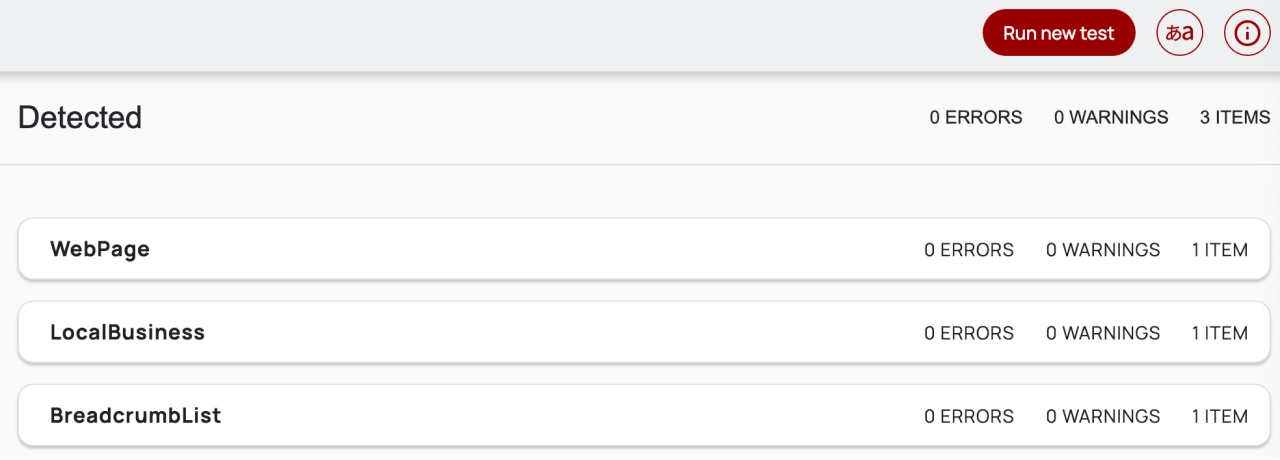10 Dispensary SEO Mistakes Costing You Customers in 2024

In this article:
The Importance of SEO#1: Neglecting Local SEO Optimization#2: Ignoring Mobile Optimization<#3: Overlooking Keyword Research#4: Failing to Create High-Quality, Relevant Content#5: Neglecting Technical SEO Aspects#6: Ignoring the Power of Backlinks#7: Failing to Optimize for Voice Search#8: Neglecting On-Page SEO Elements#9: Not Leveraging Schema Markup#10: Failing to Monitor SEO PerformanceAs a dispensary owner or marketer, you're likely aware that cannabis Search Engine Optimization (SEO) is crucial in attracting potential customers to your website.
However, many dispensaries make critical SEO mistakes that can severely impact their visibility and bottom line.
The Importance of SEO for Dispensaries
In today's digital landscape, most cannabis consumers begin their search for products and information online.
According to a State of Local SEO report by soci.ai, 80% of U.S. consumers search for local businesses weekly, with 32% searching for local businesses daily.
This statistic underscores SEO's vital role in connecting your dispensary with its target audience.
Avoiding common SEO pitfalls can significantly improve your dispensary's online visibility, attract more customers, and ultimately increase revenue.
Let's dive into the top 10 SEO mistakes our SEO agency often sees dispensaries make and learn how to address them.
#1: Neglecting Local SEO Optimization
Why local SEO matters for dispensaries
Local SEO is the cornerstone of a successful digital marketing strategy for brick-and-mortar dispensaries.
Local search queries like "dispensary near me" or "dispensary [city name]" are incredibly common, and optimizing for these searches can drive significant foot traffic to your store.

Google Business Profile Performance Tab
Key local SEO elements to focus on
To improve your local SEO, focus on these critical elements:
Google Business Profile (formerly Google My Business): Claim and optimize your listing with accurate information, high-quality photos, and regular posts.
Local citations: Ensure your business name, address, and phone number (NAP) are consistent across all online directories.
Local keywords: Incorporate location-specific keywords into your website content and metadata.
Customer reviews: Encourage satisfied customers to leave reviews on Google and other relevant platforms.
For a more comprehensive overview of local SEO, see our dispensary SEO guide on leading your local market.
#2: Ignoring Mobile Optimization
The impact of mobile-first indexing
With Google's shift to mobile-first indexing, having a mobile-friendly website is no longer optional. Statista reported over 63% of searches are now performed on mobile devices.
If your dispensary website isn't optimized for mobile users, you're likely losing out on many potential customers.

EMBR.us Performance in Google PageSpeed Insights
Tips for improving mobile user experience
To enhance your mobile SEO:
Implement a responsive design that adapts to various screen sizes.
Optimize page load speed for mobile devices.
Use large, easy-to-tap buttons and menus.
Ensure text is readable without zooming.
Avoid using Flash or other technologies that don't work well on mobile devices.
#3: Overlooking Keyword Research
The role of keywords in dispensary SEO
Effective keyword research and targeting are fundamental to any successful SEO strategy. By understanding the terms and phrases your potential customers use to search for cannabis products and information, you can tailor your content to meet their needs and improve your search engine rankings.
How to conduct effective keyword research for your niche
To improve your keyword strategy:
Use tools like Google Keyword Planner, SEMrush, or Ahrefs Keyword Explorer to identify relevant keywords with good search volume and manageable competition.
Focus on long-tail keywords specific to your products, services, or location (e.g., " infused pre rolls near me").
Analyze your competitors' keyword strategies to identify opportunities and gaps.
Regularly update your keyword research to stay current with industry trends and changing consumer behavior.
#4: Failing to Create High-Quality, Relevant Content
The importance of content in SEO
Content is the backbone of SEO. Search engines prioritize websites that provide users with valuable, relevant, and up-to-date information.
This means creating content for dispensaries that educates, informs, and engages your target audience while adhering to local regulations.

Spreadsheet with an editorial content calendar
Strategies for creating valuable dispensary content
To improve your content strategy:
Develop a content calendar that addresses topics relevant to your audience, such as strain reviews, consumption methods, and brand spotlights.
Create in-depth, authoritative content that demonstrates your expertise in the cannabis industry.
To enhance user engagement, incorporate visual elements like infographics, videos, and high-quality images.
Regularly update your content to ensure it remains accurate and relevant.
Encourage user-generated content, such as customer reviews and testimonials.
Check out EMBR’s The Best Flower of 2024 post we developed earlier this year, an illustration of using first-party POS and ecommerce data to create authoritative and topically relevant content.
#5: Neglecting Technical SEO Aspects
Common technical SEO issues
Technical SEO forms the foundation of your website's performance in search engines. Many dispensaries overlook these crucial elements, significantly impacting their rankings and user experience.

Search Console audit
How to identify and fix technical problems
To improve your technical SEO:
Regular site audits should be conducted using tools like Google Search Console or Site Audit by Ahrefs.
Ensure your site has a clear, logical structure with easy navigation.
Optimize page load speeds by compressing images, minifying code, and leveraging browser caching.
Implement SSL certification to secure your site and boost user trust.
Create and submit an XML sitemap to search engines.
Use canonical tags to avoid duplicate content issues.
#6: Ignoring the Power of Backlinks
Why backlinks matter for dispensary SEO
Backlinks remain a crucial ranking factor in Google's algorithm. They act as "votes of confidence" from other websites, signaling to search engines that your content is valuable and trustworthy.
Ethical link-building strategies for cannabis businesses
To improve your backlink profile:
Create high-quality, shareable content that naturally attracts links.
Engage in industry partnerships and collaborations that can lead to mutual link exchanges.
Participate in local events and sponsorships to earn mentions and links from community websites.
Leverage digital PR techniques to gain coverage from industry publications.
Guest posts on reputable cannabis blogs and websites.
Remember, quality trumps quantity when it comes to backlinks. Focus on earning links from authoritative, relevant sources within the cannabis industry.
#7: Failing to Optimize for Voice Search
The growing importance of voice search
With the increasing popularity of smart speakers and voice assistants, optimizing for voice search is becoming crucial. A recent research report Yagura.co found that over 50% of adults use voice search daily, which is expected to grow.
Tips for optimizing dispensary content for voice queries
To optimize for voice search:
Focus on long-tail, conversational keywords that mimic natural speech patterns.
Create FAQ pages that address common voice search queries.
Optimize for local searches, as many voice queries have local intent.
Improve your website's loading speed, as voice search prioritizes fast-loading pages.
Use structured data markup to help search engines understand your content better.
#8: Neglecting On-Page SEO Elements
Key on-page SEO factors for dispensaries
On-page SEO elements are crucial for helping search engines understand your content and its relevance to user queries.

Meta Title and Meta Description review
Best practices for optimizing title tags, meta descriptions, and headers
To improve your on-page SEO:
Craft unique, descriptive title tags for each page, incorporating your target keywords. These should be between 50-60 characters to avoid an ellipsis in the Search Engine Results Page (SERP).
Write compelling meta descriptions that accurately summarize your content and encourage clicks. To avoid an ellipsis in the Search Engine Results Page (SERP), these should be between 120 and 160 characters.
Use header tags (H1, H2, H3) to structure your content logically and include relevant keywords.
Optimize image alt text to describe images accurately and include keywords where appropriate.
Use internal linking to connect related content and distribute page authority throughout your site.
#9: Not Leveraging Schema Markup
How schema markup benefits dispensary websites
Schema markup helps search engines understand the context of your content, potentially leading to rich snippets in search results, which can increase click-through rates.
Schema markup presents an opportunity for the search engine to explicitly define what the page is about instead of having Google attempt to infer what the page is about from the content and metadata alone.

Schema.org validator results
Implementing schema markup for improved visibility
To leverage schema markup:
Use LocalBusiness schema to highlight the information on your dispensary.
Implement Product and ListItem schema for your cannabis products.
Use Review schema to showcase customer testimonials.
Add FAQ schema to your frequently asked questions page.
Utilize Event schema for any in-store events or promotions.
If you’d like to learn more about schema markup, we highly recommend Google’s documentation or schema.org.
#10: Failing to Monitor SEO Performance
The importance of tracking SEO metrics
Regular monitoring and analysis of your SEO efforts are crucial for understanding what's working and what needs improvement.
Tools and techniques for measuring SEO success
To effectively track your SEO performance:
Set up Google Analytics and Google Search Console to monitor traffic, rankings, and user behavior.
Track key metrics such as organic traffic, conversion rates, and keyword rankings.
Use tools like BrightLocal or Ahrefs to monitor your backlink profile and competitor performance.
Regularly conduct content audits to identify underperforming pages and opportunities for improvement.
Create custom dashboards to visualize your SEO progress over time.
To further explore this, check out our YouTube video on measuring local SEO success.
Taking Your Dispensary SEO to the Next Level
Avoiding these common SEO mistakes can significantly improve your dispensary's online visibility and drive more qualified traffic to your website.
However, SEO is an ongoing process that requires consistent effort and adaptation to changing algorithms and industry trends.
By creating high-quality, relevant content, optimizing for local and mobile searches, and staying up-to-date with technical SEO best practices, you can build a strong foundation for long-term success in the competitive cannabis seo landscape.
Remember, effective SEO is more than just rankings – it's about connecting with your target audience and providing them with the information and solutions they seek.
By avoiding these common pitfalls and implementing a comprehensive SEO strategy, you'll be well-positioned to attract more customers and grow your dispensary business.
Need expert help navigating the complex world of cannabis SEO? Our team at Cannabis Ad Agency specializes in delivering custom dispensary SEO services.
Contact us today for a free consultation, discover how we can help you elevate your online presence.
Looking for Local SEO Services?
GET STARTEDTable of Contents
The Importance of SEO#1: Neglecting Local SEO Optimization#2: Ignoring Mobile Optimization<#3: Overlooking Keyword Research#4: Failing to Create High-Quality, Relevant Content#5: Neglecting Technical SEO Aspects#6: Ignoring the Power of Backlinks#7: Failing to Optimize for Voice Search#8: Neglecting On-Page SEO Elements#9: Not Leveraging Schema Markup#10: Failing to Monitor SEO Performance
